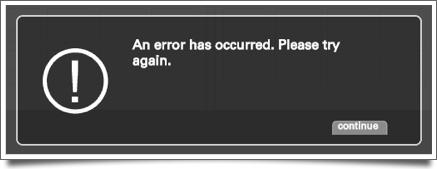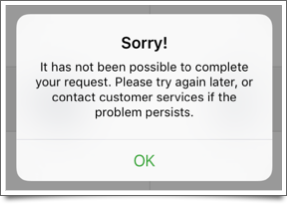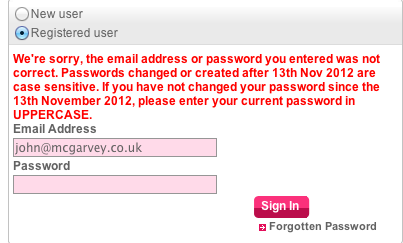Much as I love travelling by train, experience has taught me that UK rail journeys can be fraught with difficulty.
I’ve documented some of my concerns before, like ridiculous ticket options and mobile email woes.
But on Friday, I found it near-impossible to book a ticket at all. Let me explain…
The First Great Western backstory
The train company operating services from London Paddington to Bristol, Bath and the west of England was, until recently, called First Great Western.
First Great Western was such a hit that, at the height of its notoriety, it spawned several critical websites and was even subjected to a strike by its passengers.
The First Great Western moniker was retired earlier this year and the company renamed itself Great Western Railway. Given the brand’s chequered history, this decision probably makes sense.
The elegant new livery looks fresh and echoes the railway’s history. The company’s website grandly proclaims that it has ‘given the West back its Great Western Railway’.
When buying a ticket is a challenge
So far, so pretty. But the road to poor customer experiences is paved with good intentions.
Today I wanted to book a simple journey: a day return from London to Bristol. Should be easy, right?
Wrong.
First, I tried the new GWR website. Repeated attempts to book saw me stymied by an unhelpful, generic error message:

Errors are always frustrating. They obstruct your progress and prevent you achieving your goals. But errors like this are particularly irritating because they don’t explain what’s happened, nor make any attempt to apologise.
A simple ‘sorry’ — no matter how automated and insincere — is better than none at all.
What’s more, when presented with vague errors, many people blame themselves — even when the problem really isn’t with them.
Irritated by this error and somewhat lacking in patience, I turned to the company’s iPhone app. This proclaims it can store mobile tickets, so I was briefly excited at the prospect of being able to travel without a paper ticket.
My enthusiasm took a hit when my attempts to view ticket prices resulted in another supremely unhelpful message:

On the plus side, this one at least says sorry. But, again, it doesn’t tell me the cause of the error. Nor does it provide any contact details for customer services.
After seeing this 3 times, I’d had it. So I visited another train ticketing website and booked my tickets there instead.
Fresh new start, same old story?
For GWR this whole experience feels like a missed opportunity. It was my first real interaction with the company since the rebrand, and a good opportunity to impress me.
Instead, I left wondering if anything has really changed underneath the pretty new livery.
Come on, GWR. Give some thought to your customer experience, as well as to what colour you paint your trains.
They’ve tried filling email subject lines with CAPITAL LETTERS and personalising them with your name. Now I’ve noticed a new tactic from email marketers looking to boost the open rates of their email campaigns.
It’s to make their messages stand out in your crowded inbox by including special characters like stars, hearts and smiley faces in subject lines. And at first glance, it works.
I bet you notice the special characters here:

I’ve seen emails that use symbols representing the sun, an umbrella, a plane and more. There are lots of different symbols you can try and as statistics show they can help increase open rates, you can bet we’ll be seeing a lot more of them in the coming months.
But I’m not sure it’s a good idea to start using them willy-nilly in marketing emails. Here’s why:
- Like using ALL CAPITALS TO SHOUT or grabbing attention with horrific blinking text, special characters seem a little impolite. They don’t show the reader much respect. They attract eyeballs but don’t add extra information in themselves.
- It can be hard to get special characters to display properly across the wide range of software and services people use to receive email, adding extra complexity to your mailings. Broken emails just make you look silly.
- The phenomenon of banner blindness means people don’t pay attention to things that look like adverts online. As special characters become more widespread, users may start to ignore them in the same way.
Besides all that, there’s the question of taste. Special characters can look a bit, well, cheap. Like trying to entice customers into a run-down shop by playing music outside, or hassling people in the street to try your restaurant, you need to think about the image you project.
Do you want to be part of the crowd that screams ever louder for attention, or would you rather invest your time in more subtle, nuanced ways of attracting and keeping customers?
Now, I’m no expert in running trains, but you might have gathered from previous posts that I’ve had the odd run-in with train company web design, signs and labelling.
In general, it’s fair to say I’m not a fan. And now I’ve found another piece of nasty sticking-plaster copy lurking on the First Great Western website:

It seems the train company recently made its user password system case sensitive. In terms of security, this is a good move. But to accommodate the change, First Great Western decided to make everyone’s passwords all-uppercase.
If you don’t realise this when you try and sign in, you see this contrived error message:
We’re sorry, the email address or password you entered was not correct. Passwords changed or created after 13th Nov 2012 are case sensitive. If you have not changed your password since the 13th November 2012, please enter your current password in UPPERCASE.
The red text means it look like a serious error message, and it makes the user think they’ve done something wrong.
This is a classic example of a company making a well-intentioned technical change to its website, but forcing users to adapt to this change, rather than taking some extra steps to make life easier for them.
I call it ‘sticking plaster copy’ because it uses lengthy instructional copy to try and patch up the issue rather than fixing it properly.
Essentially, First Great Western has changed my password without asking. That’s inelegant and impolite. (It also raises the question of how securely user passwords are stored, but I’ll leave that issue to the technical experts.)
It makes my interaction with the website more awkward, adding an extra barrier that I have to overcome in order to buy a train ticket.
As an alternative, they could simply have allowed me to sign in as normal, then prompted me to change my password at a later point – perhaps immediately after signing in, or once I’d completed my purchase.
That would have made my life a bit easier, and it might even have positive impact on their website’s conversion rate too.




